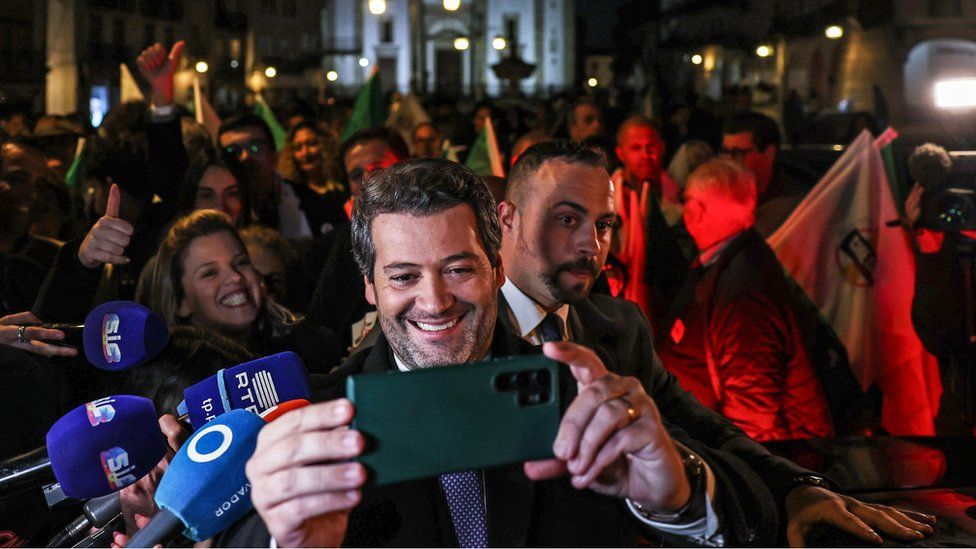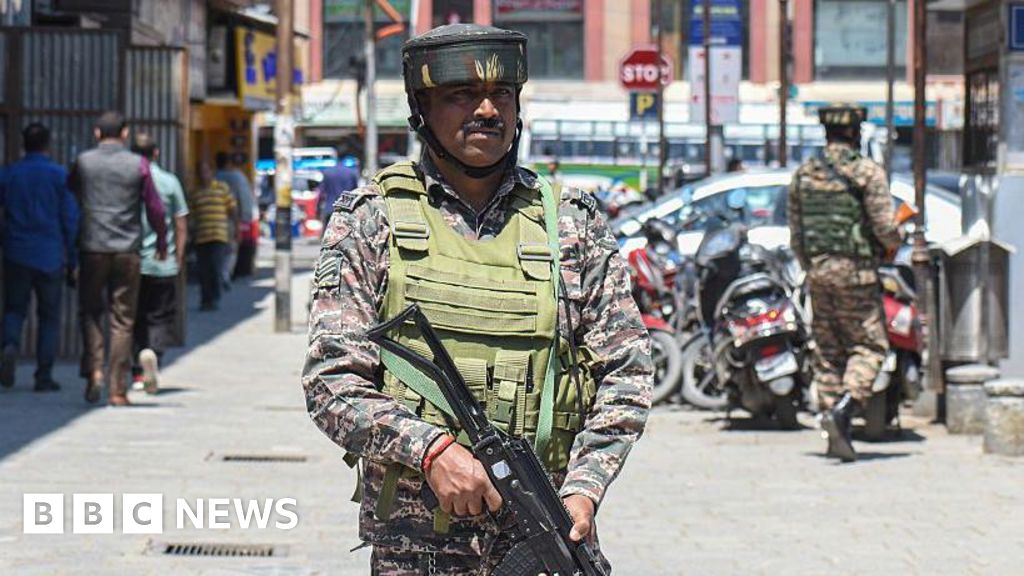ARTICLE AD BOX
 Image source, EPA
Image source, EPA
André Ventura (centre) and his far-right Chega party are now polling at 16% ahead of Sunday's legislative elections
By Alison Roberts
BBC News, Lisbon
Friday marks the last day of campaigning for Portugal's legislative elections this Sunday.
The spotlight is on the far-right Chega (Enough) party and the unprecedented role it could play in national politics, even if it remains just the third-largest force in parliament.
Its leader, André Ventura, a former councillor for the centre-right Social Democratic Party (PSD) and one-time trainee priest who made his name on national television commenting on football, has made corruption and record immigration the focus of viral social media campaigns.
First elected to parliament in 2019, he has proved an agile performer whose drastic policy shifts have done more to broaden Chega's base than undermine its credibility.
In criminal justice, where he once demanded chemical castration for rapists, he now poses as a champion of police officers demonstrating for better pay; in education and health, where Chega called for the state to bow out almost entirely, he now proposes more modest reforms, while promising higher pensions.
Sunday's snap election was called after the Socialist prime minister, António Costa, resigned after being caught up in an investigation into irregularities in state contracts - handing Mr Ventura more ammunition for his campaign.
A separate scandal in Madeira brought down the PSD regional government, making Mr Ventura's old party look like part of the problem, too.
Image source, Getty Images
Image caption,António Costa (right) has endorsed ally Pedro Nuno Santos (centre) in the election
Polls for Sunday's election show the PSD-dominated Democratic Alliance (AD) narrowly ahead of the Socialist Party (PS), but short of a majority in parliament, even with the smaller Liberal Initiative (IL).
Chega has been on 16% or more (up from 7% in the 2022 legislative elections), concentrating minds on what a minority AD government might have to do to stay in power.
The PSD leader, Luís Montenegro, has reiterated "no is no" when asked if he would seek Chega's support for the AD's programme of income tax cuts and free-market reforms.
In a televised head-to-head with Mr Ventura, he dismissed his opponent as "xenophobic, racist and demagogic".
But if a minority AD government survives until October, it may be forced to turn to Chega.
"When a government presents a budget, it negotiates with all parliamentary parties," noted Ana Sá Lopes, senior political journalist for Público newspaper. "He'll give some things to Chega, we just don't know what."
If, instead, the Socialists - now led by Pedro Nuno Santos, an energetic former minister under Mr Costa - are the largest party, after eight years in power, that could create a fresh groundswell of support for Chega.
"If the PSD doesn't win, one of my nightmares is what happened in France, where the two main parties disappeared," said Ana Sá Lopes, recalling how the far right there emerged as the main opposition.
"I'm afraid of the France scenario but we must be prepared for it."
Image source, Getty Images
Image caption,Some 10.8 million people are eligible to vote in Sunday's poll
José Peralta, a hotel receptionist in downtown Lisbon taking a break to watch flag-waving campaigners go by, summarised what many voters feel about government scandals and the state of the country.
"There's a lot of people making money on the side, and Portugal can't progress that way," he said.
"Chega may only say what people like to hear, but what they say is still true, while the parties that have been in government don't deal with the problems and don't like people discussing them."
Portugal's economy last year grew by 2.3%, faster than most other countries in the European Union, and inflation has fallen sharply. But real incomes have been slow to return to pre-pandemic levels.
Mr Costa came to power in 2015 with the support of far-left parties, promising to "turn the page" on the austerity implemented by the previous, PSD-led government under a eurozone bailout sought when investors shunned Portugal's debt.
A tourism boom then drove economic recovery until Covid hit, and again afterwards, but one side-effect was soaring rents and property prices.
Image source, Getty Images
Image caption,Tourism helped drag Portugal out of a Covid slump, but it's also pushed up rent and property prices
The PS government continued its predecessor's effort to reduce indebtedness, in the course of which it lost the far left's support but secured re-election in 2022, now with a majority.
Credit rating agencies that once labelled Portugal's debt 'junk' now rate it 'A' - but the spending squeeze that made this possible has contributed to hiring problems and a wave of public sector strikes.
"There is no shortage of doctors in Portugal, but there is a shortage of doctors in the National Health Service, where 1.7 million people still don't have a family doctor and hospital appointments and surgeries are delayed," the FNAM doctors' union highlighted this week, in its latest broadside against the government.
A total of 10.8 million people are registered to vote in the elections, in Portugal and abroad, to elect 230 members of parliament.

 1 year ago
3892
1 year ago
3892








 English (US) ·
English (US) ·